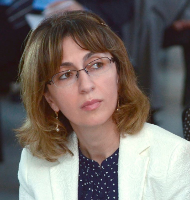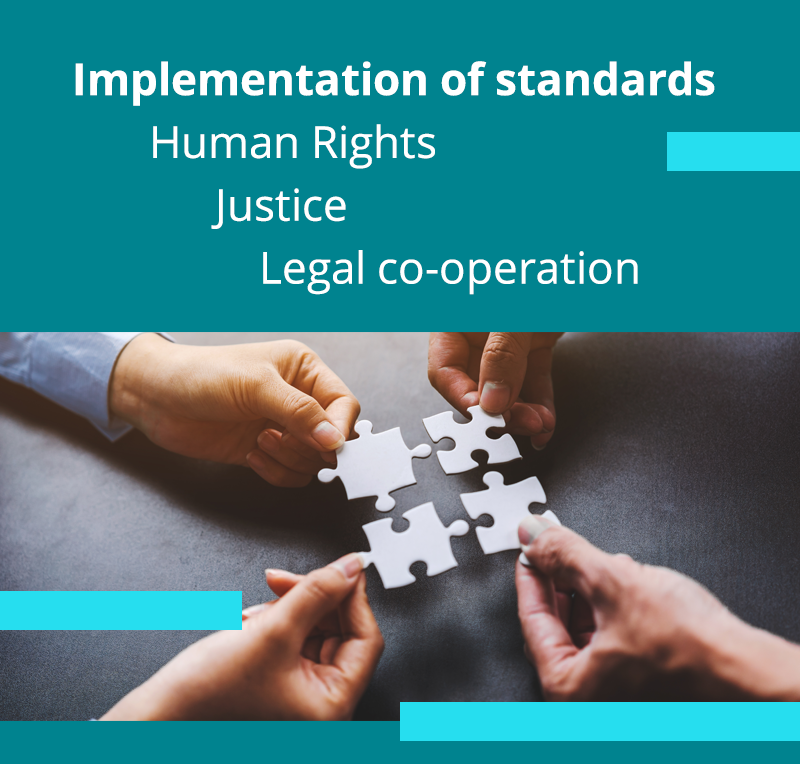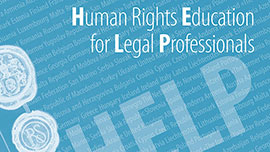Nino Bakakuri study visit to the Council of Europe

Interview with Ms Nino BAKAKURI, judge at the Supreme Court of Georgia
November 2015
You recently had a study visit to the Council of Europe, including to the European Court of Human Rights. What are your impressions? What did this visit mean for you?
The study visit was interesting and productive. We were provided with an insight into the functioning of the European Court of Human Rights and other Council of Europe bodies. We received information about various projects and programs that are designed to help judges, lawyers and other interested professionals. It is very important for Georgian judges to know how to benefit from those programs. It is also important for us to become more involved in the activities of various Council of Europe bodies that work on issues related to the judiciary.
We received information about the HELP Programme, activities of the Commission for the Efficiency of Justice (CEPEJ) and the Consultative Council of European Judges (CCJE). Evaluation Reports by CEPEJ and Opinions of CCJE are very valuable documents that deserve more attention from Georgian judges.
I have visited the Council of Europe and the ECtHR several times in the past as a human rights lawyer. However, this was my first visit to Strasbourg in my new capacity as a judge of the Supreme Court of Georgia. From judge’s perspective I see a whole range of new opportunities and I am eager to benefit from those opportunities that are in the best interests of my country. We wish to be fully involved in every Council of Europe activity that is designed to strengthen the court systems in the member states.
I found it especially interesting to hear about cases in which the ECtHR issued its newest decisions, and attend a hearing before the Grand Chamber. I think judges should be updated regarding new decisions of the ECtHR on a permanent basis.
It was also important to receive information about the steps that the Georgian Government is taking for the enforcement of decisions of the ECtHR against Georgia. In this context, it was especially important to hear that our Government is making efforts to settle many pending cases, including reopening a number of cases by domestic courts. This is a very positive development.
Meetings with the Georgian judge at the ECtHR and Georgian lawyers from the Court Registry, as well as the meeting with the Georgian Ambassador in Strasbourg, who is one of the most well-known human rights scholars in Georgia, were very productive.
Les réunions avec le juge géorgien à la CrEDH et des juristes géorgiens au Greffe de la Cour, ainsi que l’entretien avec l’Ambassadeur géorgien à Strasbourg, qui est un des meilleurs spécialistes géorgiens en matière des droits de l’homme, ont été très fructueux.
Why do you think such study visits are useful for legal professionals in general, and for judges of supreme courts in particular?
Such study visits are always useful for legal professionals, especially for judges. According to CEPEJ evaluation reports, Georgian judges deal with a very high number of cases in their everyday work. Due to huge caseload in combination with the language barrier (not all decisions are translated into Georgian), our judges do not have the possibility to permanently monitor pending cases before the ECtHR to get familiar with the newest decisions. Judges that are able to read the Court’s decisions directly in English or French have a relative advantage and we do use this advantage to apply ECtHR case law more intensively in our practice. We also assist our colleagues in obtaining information about important cases.
We have a Human Rights Centre at the Supreme Court of Georgia, which provides judges with a review and analysis of the ECtHR case law regarding each article of the ECHR and translates important decisions. However, this is not enough. The Human Right Centre’s resources are limited. Moreover, their work has been dependent so far upon the submission of requests by Supreme Court judges.
In this regard, study visits play an important role: judges are updated on the most recent developments and most important new decisions. During our visit, we had a half-day session with Mr Jeremy McBride, who provided us with a brief analysis of several cases decided by the ECtHR last year. As a result, we now have a list of important new cases with a brief description of the Court’s decisions and we can easily find all necessary elements. Such integrated and combined analysis is very useful for judges and other legal professionals. With our limited recourses, it would have taken us a considerable amount of time to collect the same information and achieve the same degree of knowledge as we’ve got in three days.
In addition, such study visits help us to feel that we are part of a bigger European family. We feel a close link between domestic courts and the ECtHR. The efficient work of domestic courts has a direct impact on the work of ECtHR and vice versa. In this regard it is also important to have regular meetings with widely recognised experts both in Tbilisi and in Strasbourg.
This is especially important in light of the new role that the Supreme Court of Georgia is to play in the domestic application of case law of the ECtHR. According to the latest amendments to the civil, administrative and criminal procedural law initiated by the Government of Georgia, the Supreme Court shall examine (at the stage of admissibility of the cassation appeals) whether decisions of the lower courts correspond to the case law of the ECtHR. A case becomes admissible for cassation review if it does not correspond to the ECtHR case law. Thus the Supreme Court shall apply the ECtHR case law more intensively, in almost every case, and evaluate the decision of lower courts from this particular perspective. This imposes a high responsibility on us. To fulfil this function, we need continuous and in-depth education regarding all articles of the ECHR. This process shall be permanent and we need wider involvement of the Council of Europe experts and professionals.
Under its newly elected Chief Justice Nino Gvenetadze, the Supreme Court of Georgia is taking important steps to make this process more efficient. We have renewed the activities of the Scientific Councils existing at the Supreme Court, this is where the Supreme Court and lower court judges, the most eminent scholars and legal professionals meet to discuss important issues. In order to achieve a coherent application of human rights standards, we have fostered the dialogue between the Supreme Court and the lower courts. The Human Rights Centre of the Supreme Court is also going to play a new role by improving its database and creating new analytical materials for judges and other legal professionals.
One of the sessions was entitled: “Georgian perspective from Strasbourg”. After the visit, could you define this perspective? And vice versa: What does Strasbourg symbolise for Georgia?
From Strasburg’s perspective, we are far from perfection and have major systemic problems. However, it is fair to note that we have been constantly improving, especially since 2012. The Ministry of Justice and the Supreme Court of Georgia have undertaken several positive steps towards progress. One of the sessions during our study visit was devoted to the discussion of Georgian cases upon which our Government has achieved friendly settlements in Strasbourg. A number of such cases will be reopened by Georgian courts. We all struggle to create domestic mechanisms for human rights protection that would significantly diminish the number of claims submitted to the ECtHR.
From Georgia’s perspective, Strasburg symbolises justice. We wish that Georgian courts will become a similar symbol. The only reason that I decided to return to the judiciary in 2014 (after my voluntary resignation from Tbilisi Appeals Court in 2008) was to contribute to the process of gaining confidence in Georgian courts. I believe we will reach a level at which people will have full trust in domestic courts and will not seek justice outside the country.
In your capacity as a judge of the Supreme Court of Georgia, in what ways do you think your country can accelerate / improve the process of national implementation of the European Convention on Human Rights?
Complex measures shall be taken in various directions. One is harmonisation of legislation to bring the legal framework in line with European standards. Legal professionals (judges, prosecutors, lawyers) need continuous legal education on how to apply the European Convention on Human Rights and the case law of the European Court of Human Rights. A fragmented approach will not be efficient. There shall be continuous cooperation between the Council of Europe bodies and the Georgian courts. In this connection, study visits are essential. Permanent updates shall be made regarding new decisions of the ECtHR.
At the same time, it is necessary to strengthen human rights centres within the domestic courts and create a good database of the ECtHR case law in Georgian, translate important decisions (not only decisions related to Georgia) and make database user-friendly. More decisions in Georgian shall be available, and the quality of translation shall be improved. Georgian judges will be able to directly cite ECtHR decisions. Legal terms applied by the Court will be translated in a uniform way. Increased use of the ECtHR cases in the Supreme Court database will ensure coherence of decisions of lower courts. More analytical materials on the practice of the European Court of Human Rights shall be translated or created in Georgian.
It is very important to implement the above mentioned measures on a step by step and continuous basis. We at the Supreme Court of Georgia are willing and able to take the lead in this process.




